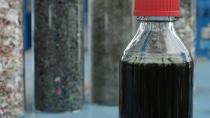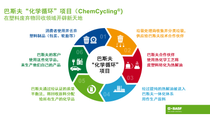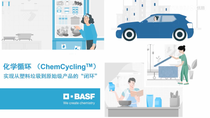可持续发展
塑料废弃物的化学循环

变废为宝的“化学循环”项目
塑料已证明了自身优势,例如帮助食品保鲜的包装应用、车辆的轻量化以及建筑保温。然而,塑料垃圾却成为全球性挑战。一方面,回收目标和可回收性的监管压力逐日增加,另一方面,我们的客户致力于增加其产品中的回收份额。解决这些挑战需要价值链上下游共同创新及努力。巴斯夫也将开发促进塑料回收利用的创新技术,为解决这一挑战作贡献。
一个关键性创新是巴斯夫“化学循环”项目(ChemCycling®),现阶段我们正与合作伙伴进一步开发热解技术。该技术可将塑料废弃物转化为二级原料热解油,在价值链的开端投入巴斯夫一体化生产以节省化石资源。基于质量平衡方案,回收材料可通过第三方审核的方法分配给最终产品。结果是,以再生塑料废弃物为原料,可以生产出质量和性能俱佳的产品。因此,客户可以使用常规生产工艺,并将其用于苛刻应用领域。
Video: Ready to scale up chemical recycling

Facts about ChemCycling®
Our Ccycled® product portfolio contributes to customer solutions for a circular economy
In ChemCycling®, BASF uses recycled feedstock derived from plastic waste for our broad Ccycled® product portfolio. The recycled feedstock is attributed to the certified Ccycled® products through a mass balance approach. BASF customers have successfully introduced Ccycled® products in various industries like (food) packaging, medical, textile and automotive.
We have established partnerships with Quantafuel, ARCUS, Pyrum and New Energy. Quantafuel and ARCUS are specialists for pyrolysis of mixed plastic waste, Pyrum and New Energy are specialized in the pyrolysis of end-of-life tires. With these partnerships, BASF has taken a significant step towards establishing a broad supply base for pyrolysis oil and towards offering customers certified products from chemical recycling on a commercial scale.
However, any new recycling process needs acceptance as recycling from market and regulators. There are still some open questions with regards to technology, economy and regulation. We closely engage with the relevant stakeholders to tackle these challenges.
在塑料废弃物回收领域开辟新天地

化学循环:实现从塑料垃圾到原始级产品的“闭环”

化学循环相关信息
- 相辅相成:大量经过分类的单流塑料可以且应该进行机械回收,而化学循环则可以用来处理混合塑料废弃物,因为这类废弃物往往无法分类或高效分类以进行高价值的机械回收。通过热解,大约 70% 的混合塑料废弃物可以转化为次级原料。
- 品质如一:通过化学循环利用,塑料废物流可以转化为化学工业的原料,并通过质量平衡方案分配至采用巴斯夫一体化系统生产的产品。这些产品具有与以化石原料生产的产品完全相同的特性。
- 易于使用:客户可采用与常规生产相同的方式来处理这些产品,并将其用于对质量、卫生状况和性能要求更高的应用中,例如医疗应用、食品包装或与对安全至关重要的汽车零件。
- 认证过程透明公开:质量平衡方案(将循环回收原料按比例分配给产品的方法)以及产品本身均由独立审核机构进行认证。
- 解决方案为导向:化学循环是高性能塑料(例如复合包装)的归宿之一。出于机械回收目的重新设计塑料产品和包装,可能导致性能降低或废弃物体积增加等弊端,因此这种做法并非总是可行或可取。
在“化学循环”(ChemCycling®)项目中,巴斯夫使用从塑料废弃物转化而来的原材料,用于生产广泛的 Ccycled® 产品组合。通过质量平衡方法,回收原料被分配到经认证的Ccycled® 产品。巴斯夫的客户已成功将 Ccycled® 产品应用于诸多下游行业,包括(食品)包装、医疗、纺织和汽车行业。
巴斯夫已与 Quantafuel、ARCUS、Pyrum 及 New Energy 建立合作伙伴关系。Quantafuel 和 ARCUS 公司专门从事混合塑料废弃物热解。Pyrum 以及 New Energy 公司则专门从事废弃轮胎热解。通过这些合作伙伴关系,巴斯夫已迈出重要的一步,为热解油建立了广泛的供应基础,并以商业化规模向客户供应经认真的化学回收塑料废弃物原材料生产的产品。
然而,任何新的回收工艺需要市场和法规制定者的认可。在技术、经济性和法规层面仍有一些问题有待商榷。我们将与相关方保持紧密联系,以应对这些挑战。
What is a Ccycled® product?
Conventional fossil raw materials required to manufacture BASF products are replaced with recycled feedstock from the chemical recycling of plastic waste or end-of-life tires along BASF’s integrated production chain. The corresponding share of recycled feedstock, e.g. pyrolysis oil, is attributed to the specific Ccycled® product via a certified mass balance approach. BASF sites and Ccycled® products are third-party certified according to internationally recognized certification schemes like REDcert2 and ISCC PLUS and meet the definitions by ISO 22095:2020. The recycled feedstock is not measurable in the BASF mass balance product. The cradle-to-gate PCF is calculated according to TfS Methodology using both a cut-off approach and an Upstream System Expansion (USE) approach. USE accounts for a credit for the displaced waste treatment from the first life cycle (e.g. incineration), thereby reducing the product carbon footprint compared to the equivalent conventional fossil product.














